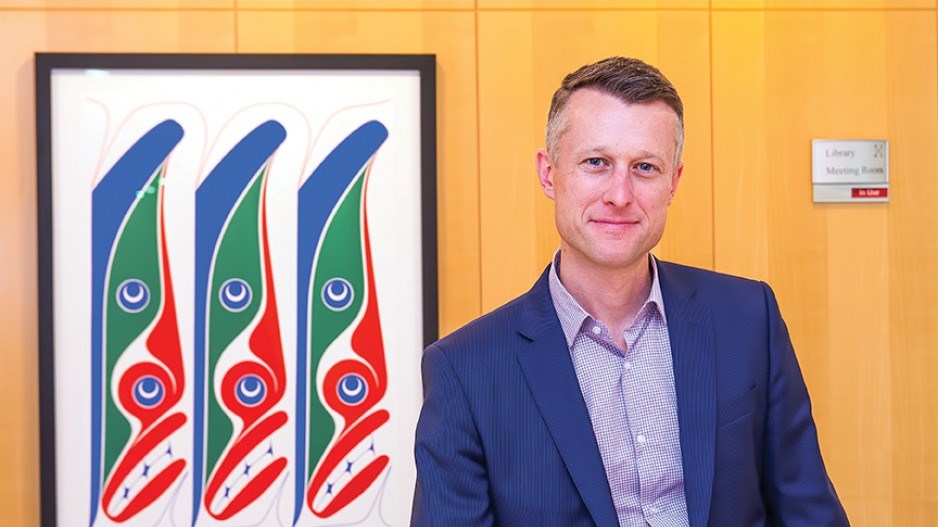Ian Mortimer admits that when he chose to study microbiology for his undergraduate degree at the University of British Columbia (UBC), he wasn’t sure if the biotech business would be the best fit for his career.
“I entered university not knowing whether I was going to go down more of a scientific--medical path or I was going to go into business,” Mortimer recalled of his eventual decision to study science. “But my family background is entrepreneurship, so I always felt I can go back to business if I wanted to. That was why I pursued an undergraduate scientific degree.”
That decision led him on a path to what he describes as the “best of both worlds” – working on the business and corporate side of the biotech industry. After working at two laboratories during his time at UBC, Mortimer had an opportunity to move to the business operations side of one lab, which he credits for starting his career.
Today, Mortimer is the CFO, COO and corporate secretary for Burnaby-based Xenon Pharmaceuticals Inc. (Nasdaq:XENE). He helped oversee the company’s major transition from a private, partnership-driven group to a publicly traded biotech company that is developing a number of its own medical products for commercialization.
Xenon was listed on Nasdaq in 2014, a year after the company brought Mortimer from Tekmira Pharmaceuticals Corp. – now Arbutus Biopharma Corp. (Nasdaq:ABUS) – another firm that the executive helped take public. But while that was one of Mortimer’s key missions at Xenon, it is only a single part of the overall objective he and other executives hoped to complete for the company’s full-scale transformation.
“Historically, Xenon had done a lot of work with pharmaceutical partners, and a lot of the work is through other companies,” Mortimer said. “One of the focuses for going public was to be able to define our company and develop our own proprietary products. We wanted a pipeline of drug candidates that we owned ourselves.
“Our vision overall is to be a premier neuroscience company,” he added, noting that the capital raised by going public is largely going towards a firm that is, in a way, more in charge of its own destiny. “We want multiple drugs in development, and we want those key capabilities, all from research and drug identification/discovery through developing that drug and commercializing it, internally.”
Going public has certainly helped in that regard. In 2018 alone, Xenon was able to raise more than $100 million through corporate financing transactions. The additional funds have also done wonders for its operations, especially on the clinical side where researchers can now put new drugs to human clinical trials and, eventually, apply for regulatory approval.
“We hope to be in a position in the next five years … to commercialize one product candidate,” Mortimer said. “We are really focusing a lot of our programs on epilepsy, especially on rare forms of pediatric epilepsy; these children have a debilitating disease, and there is an absolute need for new drugs. So over the next five years, the goal is really to be able to commercialize some of our products.”
The journey wasn’t without its challenges, he noted. Going public came with regulatory requirements, such as providing financial statements and other information to agencies like the U.S. Securities and Exchange Commission. But those steps are easier than the transition Xenon had to make in the way it communicates – especially externally with investors and the general public.
“We are a research company; we have very technical work in terms of what we do,” Mortimer said. “How do you take that information and communicate it so that people from the outside world can understand what you are doing? People want to measure your progress. They want to measure your success against certain milestones.
“As an R&D company, we don’t have revenue. We are not a profitable company, and we don’t have a commercial product. All of our success and how you measure it is about the milestones we are going to achieve as an organization. So it’s a big shift in thinking when you are now communicating, on a very frequent basis, to outside stakeholders about what you are trying to achieve.”
Mortimer said the team at Xenon is up to the challenge, and the company’s success so far is a reflection of the effort made by the entire team of 90 people at the firm over the last few years.
Asked if he would do anything differently in his career if he had the choice, Mortimer said he would tell his younger self to slow down a bit and enjoy the process, because there’s little in the rest of the journey that he would alter.
“I’ve been super fortunate,” he said. “I really enjoy what I do, and I’ve worked with some amazing people and cutting-edge research. I’ve actually worked on two programs that led to approved drugs, I’ve taken two companies public on Nasdaq, and I’ve been able to stay in Vancouver to raise a family. So I wouldn’t change anything about my career.” •
Business in Vancouver and the Chartered Professional Accountants of British Columbia will honour the province’s top CFOs at the BC CFO Awards gala dinner, being held June 6 at the Fairmont Waterfront Hotel. For more information or to register, go to biv.com/bc-cfo-awards.




